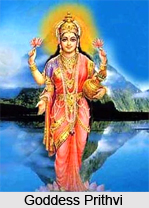 Goddess Prithvi is the Hindu Goddess of Earth. In Rig Veda Goddess Prithvi is never addressed alone. She is always to Dyaus who is the male deity associated with the sky. She is part of the compound dyavaprithvi. Both these deities are interdependent. They are considered as the parents who have created the world. Thus Dyaus is often called the father and Prithvi is known as mother.
Goddess Prithvi is the Hindu Goddess of Earth. In Rig Veda Goddess Prithvi is never addressed alone. She is always to Dyaus who is the male deity associated with the sky. She is part of the compound dyavaprithvi. Both these deities are interdependent. They are considered as the parents who have created the world. Thus Dyaus is often called the father and Prithvi is known as mother.
There are several legends associated with Goddess Prithvi. Once they were parted by Lord Varuna. However they united Heaven fertilizes earth with rain. Other than her maternal and productive characteristics she is also known for her supportive nature. She accommodates everything and is stationary. Goddess Prithvi along with Heaven is prayed for wealth, power. The waters produced by the duo are considered as pure, nourishing and fertile. People also worship them together for protection from danger, to compensate sin thereby bringing in happiness. Generally in a funeral the dead person is asked to go to the lap of mother earth. She is often requested to cover the dead tenderly.
Atharva Veda has hymns sung in praise of Goddess Prithvi only. In the text she is mentioned as wife of Lord Indra. Lord Vishnu strides over her and Parjanya, Prajapati and Lord Vishwakarma protect and provide her requirements. It is said that Lord Agni pervades her. However despite these associations Goddess Prithvi is a deity in her own right according to the hymn. The hymn focuses on her fertility as she is the source of all plants as well as responsible for the nourishment of all living creatures.
Goddess Prithvi has a benevolent presence in the Vedas. She is also considered as nursing Goddess. Atharva Veda is the only ancient text where she is treated as a separate deity. She is addressed by several epithets like Bhumi, Dhatri, Dharitri, Janitra, Medini, Prshni,Vanaspatinam Grbhir Osadhinam, Vishvadhaya, Vishvagabha, Vishvamshu,
Vishvasvam, Dhara, Drdha , Ksama , Sthavara , Vishdava, Vishvadharini, Vishvamhara, Ratnagarbha, Ratnavati and Vasundhara.
In the Brahmanas, Goddess Prithvi is identified with Aditi. Towards the later stage in the Vedas she emerges as an independent Goddess.









